The Federal Executive Council (FEC) has approved a seven-year moratorium on the establishment of new federal tertiary institutions across Nigeria. The decision, announced following Wednesday’s FEC meeting, affects all proposed universities, polytechnics, and colleges of education under federal control.
Speaking at a media briefing, Minister of Education, Dr. Tunji Alausa, explained that the ban is aimed at curbing the unchecked expansion of tertiary institutions, which has contributed to severe strains on infrastructure and academic staff across the country.
“In Nigeria, the issue is no longer access to education, but rather the uncontrolled duplication of federal tertiary institutions, which is reducing the capacity and quality of existing institutions,” Alausa said. “This has resulted in the deterioration of infrastructure and manpower, threatening the quality of education and the global reputation of Nigerian graduates.”
Alausa presented an overview of the country’s tertiary education system, noting that Nigeria currently hosts 72 federal universities, 108 state universities, and 159 private universities, in addition to hundreds of polytechnics, colleges of education, and specialized institutions such as monotechnics and colleges of health sciences, agriculture, and innovation.
Despite the large number of institutions, Alausa revealed a low application rate in many schools. “For the 2024–2026 academic years, 2.1 million students applied to tertiary institutions. However, 199 universities recorded fewer than 99 applicants, and 34 universities had no applicants at all,” he said.
The situation was similarly alarming in non-university institutions. According to the minister:
219 colleges of education recorded similarly low interest
295 polytechnics had fewer than 99 applicants
64 colleges received zero applications
Describing the trend as an “inefficient use of public resources,” Alausa cited one federal university in northern Nigeria with fewer than 800 students but over 1,200 staff, calling the model unsustainable.
The newly approved policy, he said, is designed to redirect funds and energy toward upgrading existing institutions, enhancing infrastructure, expanding student capacity, and improving academic quality rather than launching new schools.
“We must focus on improving the quality of education and increasing the carrying capacity of existing schools so that our graduates can maintain and enhance the global respect they enjoy,” the minister said.
Alausa also praised President Bola Tinubu for his support of the initiative, describing the President as a strong advocate for world-class education for all Nigerians.
While the federal moratorium applies strictly to new government-owned institutions, the council did approve the creation of nine new private universities during the same session. According to Alausa, these approvals were for long-standing applications that had faced delays due to inefficiencies in the National Universities Commission (NUC).
“Some of these applications have been pending for over six years,” he explained. “Investors had already built campuses and committed significant resources. The new approvals are part of an effort to clear backlogs and reform the system.”
The minister further disclosed that the Ministry of Education had deactivated over 350 inactive private university applications, reducing the number of pending applications to 79, of which nine were approved this week.
Looking ahead, Alausa confirmed that the moratorium would extend to all categories of tertiary institutions—both public and private—including polytechnics and colleges of education. New applications will not be considered unless they meet updated quality benchmarks.
He concluded with a warning on the implications of inaction: “If we don’t act now, we risk increased graduate unemployment and a weakening of our national human capital index. This policy is essential to protect the quality and global standing of Nigerian education.”





